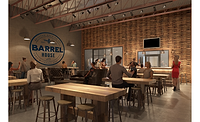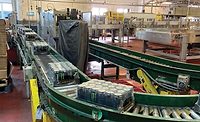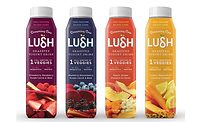Customized beverage needs heighten demand for co-packers
Production of functional beverages and shots streamlined

The 1989 film “Field of Dreams” made popular the saying “If you build it, they will come.” But in some cases, building a new production line and adding new filling and labeling equipment and the ilk, doesn’t make financial sense. Therefore, beverage-makers are weighing macro trends in the beverage market, including the expansion of cold-brew coffee and high-pressure processing (HPP), without incurring the often million-dollar expense of directly producing and bringing better-for-you products to market.
A number of macro trends are empowering beverage innovation and contract packagers/contract manufacturers are helping to fill an important need state, experts say.
“We’ve seen growth in innovation and trends in plant-based beverages as well as the emergence of ready-to-drink (RTD) coffee drinks in both single-serve and multi-serve packaging,” says Jim Walsh, executive vice president of sales at HP Hood LLC, Lynnfield, Mass. “This trend is inviting many [consumer packaged goods] (CPG) brands across the U.S. to engage in retail, vending and foodservice channels.
“Previously, CPG companies have had to make significant capital investments in order to innovate,” he continues. “Today, contract manufacturing provides access to capacity and the latest technology without the need for upfront investment and allows them to be more agile and obtain faster speed to market for new products.”
With 13 manufacturing facilities, HP Hood offers state-of-the-art aseptic manufacturing, co-packing, extended-shelf-life packaging (ESL), ultra-high temperature processing (UHT), low-acid processing technologies as well as cultured and frozen processing.
In its State of the Industry report, the Reston, Va.-based Contract Packaging Association (CPA) reports sales of $25.6 billion for contract packaging/contract manufacturers serving the U.S. food and CPG sector. The industry is projected to grow at two to four times the pace of the sector it serves, it adds.
Among the benchmark trends driving the industry are the Amazon/Walmart effect, private equity investment, grocery and food company consolidation, and offshore and Mexico-based competition, the association reports.
“Our industry continues growing at double-digit rates and has become a critical part of food and CPG supply chains,” said Tim Koers, CPA president, in a statement.
CPA’s Managing Director Ron Puvak adds that membership is growing at approximately 12.2 percent with capabilities and investment in contract packaging at record levels. “We continue to see more transition from in-house manufacture to outsourced providers,” he says.
‘Retail space’ evolving
Puvak points to the proliferation of SKUs with healthy clean-label attributes, the decline of more traditional products and new channel delivery as chief reasons why the retail space is evolving. “More craft sodas [are] appearing to satisfy new consumer (millennials) demands and tastes,” he says. "Omni-channel and eCommerce demand are transforming the industry, altering the definition of ‘retail space.’ We also cannot ignore the growth of private label and store brands.
“Aseptically filled products continue to proliferate, many from startup and emergent brands that utilize contract packagers and contract manufacturers (CPCMs),” Puvak continues. “Additionally, cold-pressured processed products are gaining popularity and CPCMs are providing these leading-edge technology services.”
Walter Orcutt, executive vice president at NVE Pharmaceuticals Inc., Andover N.J., highlights the innovation in value-added sparkling waters infused with botanicals, nootropics, hemp and exotic flavors.
“Clean labels are a must,” Orcutt says. “High-fructose corn syrup (HFCS) as a sweetener in beverages will be a thing of the past in the very near future and organic cane (and beet) sugar will be the main sweetener but used sparingly. Exotic natural sweeteners like monk fruit will play a role but only if the pricing comes down to earth.”
Experts note the sheer variety of better-for-you beverages in the market are expanding the need for co-packaging lines. For instance, Stay Fresh Foods, Pennsauken, N.J., recently added beverage co-packaging services to its HPP tolling center. The new line, which duplicates the configuration of the company’s Meriden, Conn., facility, includes drum chipping equipment, blending tanks, large-scale cold-brew capacity, rotary filling and labeling, it said in a statement.
The new line doubles Stay Fresh Foods co-packing capacity, which now exceeds 50 million bottles a year at both locations. Its HPP capacity is capable of 100 million pounds a year. “HPP is a key enabler behind the growing consumer demand for healthful, preservative-free, all-natural products,” said Amy Lawless, chief executive officer of Stay Fresh Foods, in a statement. “As food manufacturing veterans, co-packing is a natural fit for use, and our ‘everything-under-one-roof’ approach presents an attractive value proposition to beverage innovators across the country.”
In the past five years, the contract manufacturing business has gotten more robust, offering an expansion of capability and capacity needed to accommodate large-volume opportunities with higher-speed equipment, a higher level of safe quality food (SQF) and organic certifications, says Jayne Sebastian, director of business development at Southeast Bottling & Beverage, Dade City, Fla.
“The contract/co-manufacturing business is much more focused, fine-tuned and efficient, resulting from proactive planning for customer needs and responding with customized solutions,” Sebastian says.
Minimizing capital expenses
Health-and-wellness trends are impacting contract packaging and manufacturing operations. “Niche is in,” explains Gary Hemphill, managing director of research at New York-based Beverage Marketing Corporation (BMC). “Targeted beverage brands are growing better than traditional mass market categories with the exception of bottled water. The growth in the number of these products has heightened the demand for contract packing.”
BMC’s October report, “Private Label Beverages & Contract Packaging in the U.S.,” notes that the expanding spectrum of new age beverages and craft beer, along with packaging innovations has enabled the contract packaging industry to evolve from a “last resort capacity alternative” to a “highly specialized essential resource” for brand owners.
“In the past, most contract packaging facilities were plants with excess available capacity that undertook contract packaging on an ad hoc basis,” the report states. “The motivation was to keep production lines humming and running at their highest capacities and efficiency rates. Contract packaging has … reduced the allocation of plant fixed costs. Now, many companies with production facilities maintain manufacturing ‘partnerships,’ which minimize additional capital investments.”
Many new age beverages have widespread distribution but limited volume so these products often require manufacturing at multiple locations, involving volumes much too small to justify plant involvement, the report says. The demand for hot-fill products also has led large companies with big brands to turn to contract packers to meet their production needs, it adds.
Contract packagers are offering customers more convenience at a lower cost along with incentives to invest in new processing and packaging technologies. “The biggest benefit of working with a contract packer is brand owners don’t incur the cost of building an entire production facility, which can come at a very steep price,” BMC’s Hemphill says. “For large companies with low-volume, niche products that require specialized production, the benefit is the same.”
Eric Miller, chief executive officer for Brooklyn Bottling Co., Milton, N.Y., notes that startup companies and newly successful companies often require a flexible co-packer to manage custom requirements. Regardless of whether a beverage company is small or large, the benefits and cost-savings can be significant.
“Beverage companies will not have to invest their working capital on fixed assets needed to open a bottling plant. They will be able to focus their resources on sales and innovation instead of production,” Miller explains “A large company usually packs in a few geographically efficient plants and [can] save on shipping expenses, CAPEX and HR resources versus self-manufacturing.”
Southeast Bottling & Beverages’ Sebastian further elaborates on the benefits. “If a small beverage company comes to us, they are looking for bottling, but they also need advice about hot-filling, bottle options, capping and labeling, and have a variety of concerns,” she says. “They usually don’t understand all the steps in the process, from taking their ‘idea’ from concept to product launch or the necessary trial/test run needed to validate materials. A good co-packer will provide the best solutions.”
Larger beverage companies, on the other hand, are most interested in the facility and operational strength a contract packager can provide. “They require the highest level of Quality Assurance, certifications and documentation,” Sebastian says. “They need strong supply-chain expertise. When they approach us, we have everything they need.”
To keep pace with heightened demand for hot-fill, shelf-stable beverages including hydration drinks, protein waters, RTD teas, sports drinks and liquid dietary supplements, Southeast operates a Monoblock system running as many as 250 bottles a minute, a cooling tunnel with chiller and more than 35,000 gallons of tank capacity in temperature-, humidity-controlled and HEPA-filtered filling rooms.
NVE Pharmaceutials offers contract packaging services for functional beverages and shots, craft sodas and enhanced sparkling waters. It fills 12-ounce carbonated cans at a rate of as much as 600 cans a minute while it produces functional shots at 250 bottles a minute on four lines, Orcutt says.
According to BMC's report, approximately 15 percent of beverage production in the United States is contract packaged. This equates to just more than 3.1 billion 288-ounced cases including chilled products, but excluding dairy, it adds.
With co-packing impacting so much of the beverage market, flexibility is crucial for contract packagers to continue to thrive, experts say.
“There are so many moving parts and variables, especially on startup projects,” NVE's Orcutt says. “Additionally, flexibility in different packaging options and even doing some parts of the production by hand to get the product to market is a new plus for new brands.”
Brooklyn Bottling’s Miller adds: “In this market, it is all about flexibility. However, if you do not include reliability and quality, you will not maintain and grow your business.” BI
Looking for a reprint of this article?
From high-res PDFs to custom plaques, order your copy today!







